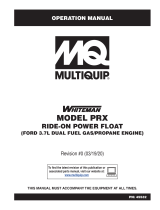
Safety Information CRT 48–33K
12 wc_si000713gb.fm
1.2 Machine Description and Intended Use
This machine is a ride-on concrete finishing trowel. The Wacker Neuson Ride-On
Trowel consists of a frame onto which are mounted a gasoline or diesel engine, a
fuel tank, a water tank, two gearboxes joined by a drive shaft, and an operator’s
platform with controls and a seat. A set of metal blades is connected to each
gearbox. A ring guard surrounds the blades. The engine rotates the blades via the
gearboxes and a clutch mechanism. The rotating blades ride on the surface of
curing concrete, creating a smooth finish. The operator, who sits on the operator’s
platform, uses the controls and the throttle pedal to control speed and direction of
the machine.
This machine is intended to be used for floating and burnishing curing concrete.
This machine has been designed and built strictly for the intended use described
above. Using the machine for any other purpose could permanently damage the
machine or seriously injure the operator or other persons in the area. Machine
damage caused by misuse is not covered under warranty.
The following are some examples of misuse:
Using the machine as a ladder, support, or work surface
Using the machine to carry or transport passengers or equipment
Using the machine to finish inappropriate materials such as slurries, sealers, or
epoxy finishes
Operating the machine outside of factory specifications
Operating the machine in a manner inconsistent with all warnings found on the
machine and in the Operator’s Manual
This machine has been designed and built in accordance with the latest global
safety standards. It has been carefully engineered to eliminate hazards as far as
practicable and to increase operator safety through protective guards and labeling.
However, some risks may remain even after protective measures have been taken.
They are called residual risks. On this machine, they may include exposure to:
Heat, noise, exhaust, and carbon monoxide from the engine
Chemical burns from the curing concrete
Fire hazards from improper refueling techniques
Fuel and its fumes, fuel spillage from improper lifting technique
Personal injury from improper lifting techniques
Cutting hazards from sharp or worn blades
To protect yourself and others, make sure you thoroughly read and understand the
safety information presented in this manual before operating the machine.





















